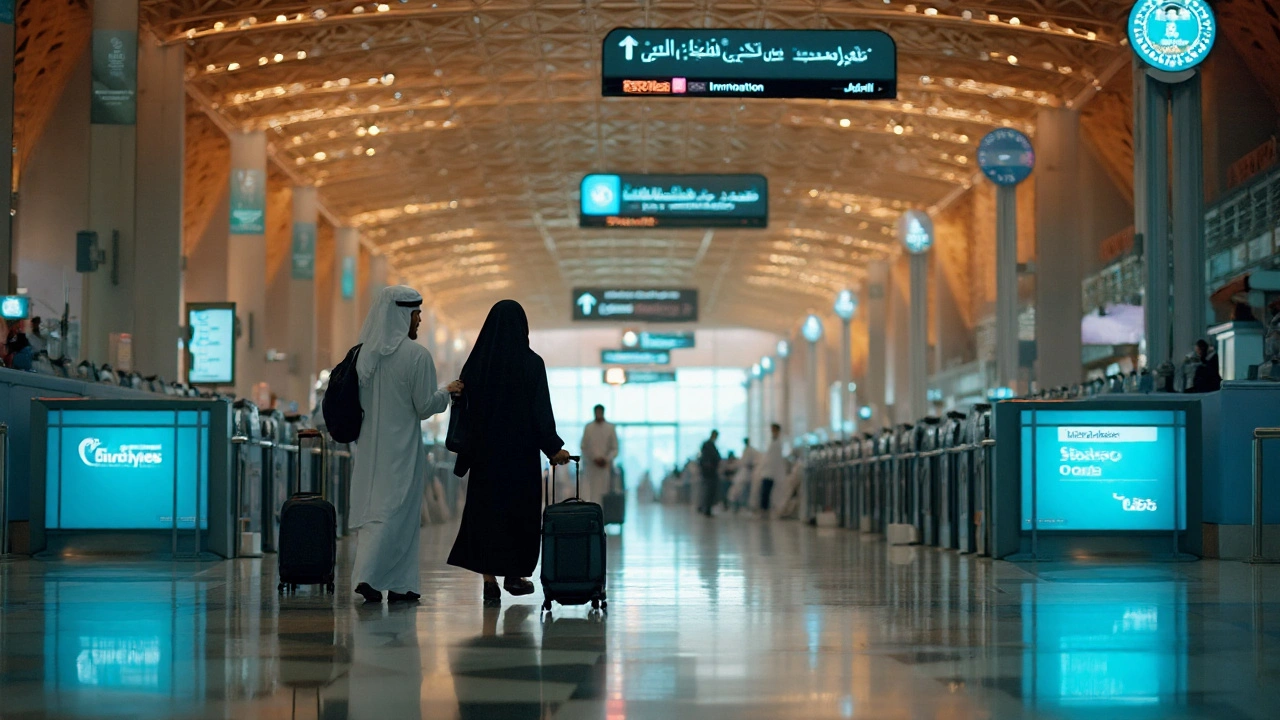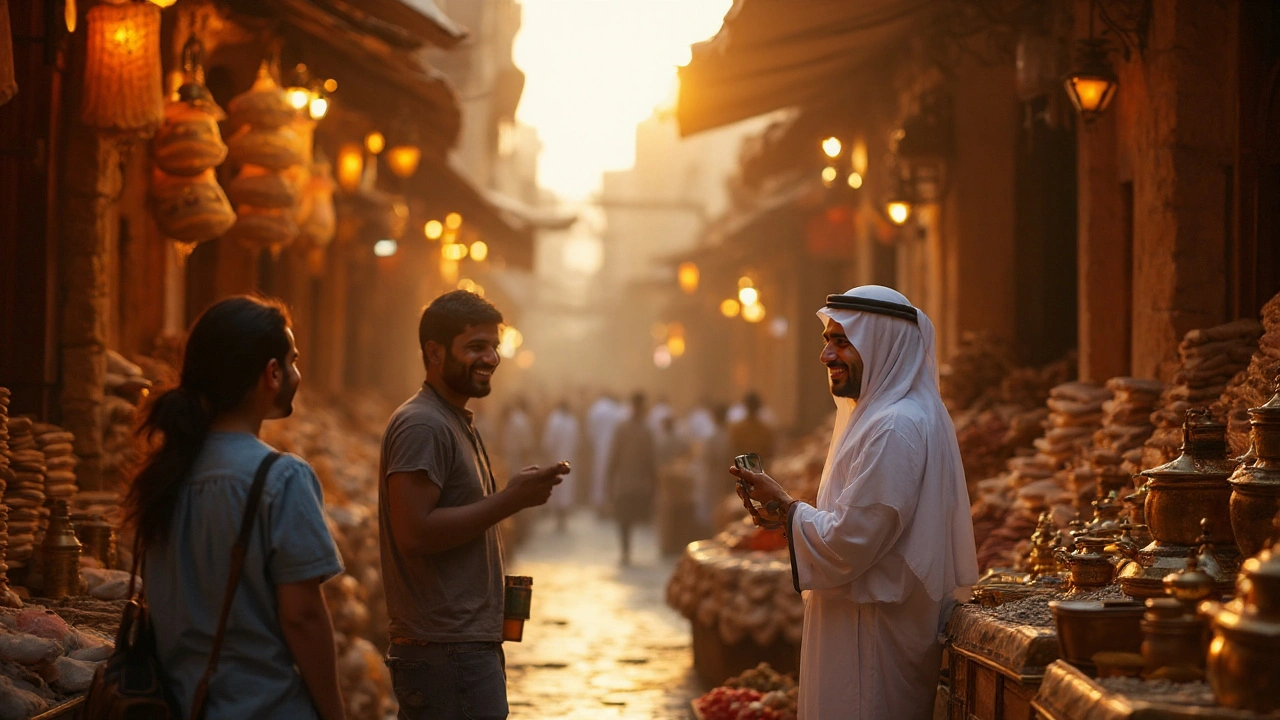What Language Is Spoken in Dubai? Arabic, English, and Everyday Phrases (2025 Guide)
 Sep, 12 2025
Sep, 12 2025
Short answer? You’ll get by just fine with English in Dubai. But the country’s official language is Arabic, and knowing a handful of phrases opens doors. This guide gives you the exact words, cues, and rules you’ll lean on-from the airport to taxis, hotels, souks, and government counters-so you can communicate smoothly without second-guessing yourself.
TL;DR: The languages you’ll hear in Dubai
If you clicked to settle a simple doubt-what’s the language spoken in Dubai?-here’s the tight version, then we’ll go deeper.
- Official language: Arabic. The UAE Constitution designates Arabic as the state language. Government documents and courts rely on Arabic as the authoritative text.
- Everyday lingua franca: English. You can use English almost everywhere-airport, hotels, taxis, malls, restaurants, tours, and most business settings.
- Common community languages: Hindi and Urdu are very widely understood; you’ll also hear Malayalam, Tamil, Bengali, Punjabi, Tagalog, Persian (Farsi), Russian, and Mandarin in shops and neighborhoods.
- Signs and announcements: Bilingual Arabic-English across metro, roads, airports, and most public spaces (RTA and airport systems use both).
- Documents and contracts: Expect bilingual formats, but Arabic prevails where there’s a conflict (e.g., standard employment contracts issued via MOHRE).
- 2025 context: With around 88-90% expatriate residents (Dubai Statistics Center trend), English remains the practical bridge language. Basic Arabic is still the move for courtesy and clarity.
One nuance: “Arabic” in formal settings means Modern Standard Arabic (MSA). On the street, you’ll hear Gulf Arabic (Khaleeji). Your simple MSA-friendly phrases-salaam, shukran, min fadlak-work fine with everyone.
How to navigate Dubai by language (step-by-step)
Think of this like a mini playbook. Follow these steps and you won’t stumble.
-
Before you fly: Download Arabic offline in your translation app. Save key screenshots-your hotel’s name in Arabic, your itinerary, reservation confirmations. Learn 8-10 phrases (below). If you’re more comfortable in Hindi or Urdu, prep those too-many drivers and staff understand both.
-
At the airport (DXB): Wayfinding and immigration are Arabic-English. Officers commonly speak English. A warm “salaam alaikum” (hello/peace be upon you) and a smile go a long way. If you’re unsure about a question, ask “Could you repeat that in English, please?”
-
Taxis and ride-hailing: RTA taxi drivers usually manage in English, plus Hindi/Urdu. Show your destination on a map. If pronunciation trips you up, hold out your phone and say, “Here, please.” If needed, ask hotel staff to say the destination in Arabic to your driver over the phone.
-
Metro and buses: Station names are announced in both Arabic and English. Maps, machines, and signage are bilingual. If you’re stuck, “ayna al-mahattah?” (Where’s the station?) helps, but pointing to a map is faster.
-
Hotels and attractions: Front-desk and concierge staff are multilingual. English is default. You’ll also hear Russian in beach districts, Chinese around Dragon Mart, and Tagalog across hospitality. If you have a special request, keep it short and plain-global teams understand clear English best.
-
Restaurants and cafes: Menus are usually bilingual. In casual spots, staff may be more comfortable in Hindi/Urdu or Tagalog; in fine dining, English is smooth. If something is unclear, point to the menu and say “This, please.” For the bill: “al-fatoorah, min fadlak?” (the bill, please).
-
Souks and markets: English works, but you’ll often bargain in a mix of English and Hindi/Urdu. Key words: “Kam?” (How much?), “ghali” (expensive), “akheer” (final). Keep it friendly. A little Arabic lowers the temperature and the price.
-
Banks, clinics, and government counters: Forms and portals are bilingual, but Arabic is the decisive language in legal contexts. If you’re signing anything, ask for the Arabic copy as well as the English and confirm both match. Staff will usually explain in English on request.
-
Business meetings: English dominates in private sector and free zones. For government-facing work, Arabic matters. It can help to open with a short Arabic greeting-“sabah al-khair” (good morning)-then switch to English.
-
Emergencies and help: Operators and responders handle Arabic and English. Keep directions simple: nearest landmark, building name, floor. Show, don’t describe-maps beat long explanations.
-
Etiquette that boosts your odds: Start in English with a greeting. If you know a phrase, use it. Speak slowly, avoid slang, and trim idioms. If someone looks unsure, write it down or show a photo. Smiles do heavy lifting across languages here.
Why this works: Dubai’s systems are built bilingual by design-RTA transit, airport operations, tourism touchpoints-so your default English lands almost everywhere. Courtesy Arabic signals respect, which makes people more eager to help.

Examples, phrases, and real-life scenarios
Keep these pocket phrases handy. They index straight to the most common moments: greeting, asking, buying, and thanking. I use them every time I pass through Dubai.
- Hello: salaam alaikum. Response: wa alaikum as-salaam.
- Good morning/evening: sabah al-khair / masa’ al-khair.
- Please (to a man/to a woman): min fadlak / min fadlik.
- Thank you: shukran. Extra polite: shukran jazeelan.
- Yes / No: na’am / laa.
- Excuse me / sorry: law samaht / aasif.
- Do you speak English? hal tatakallam al-inglizi?
- How much is this? bikam hatha?
- Where is the metro? ayna al-metro?
- The bill, please: al-fatoorah, min fadlak.
- Water / cold water: maa’ / maa’ bareed.
- I don’t understand: laa afham.
Pronunciation tips so you sound clear:
- kh = a throaty “h” (as in khalas, finished)
- gh = voiced “r” in the throat (ghali, expensive)
- q = deeper “k” (Qatar, Qur’an), but in Gulf dialect you’ll often hear it softened
- Stress often falls near the end: shuk-RAN, ma-sa’ AL-khair
Helpful crossovers in other common languages (use only if it’s natural for you):
- Hindi/Urdu: “English bolte ho/bolte hain?” (Do you speak English?) “Kitna?” (How much?)
- Tagalog: “Pwede English?” (Can we use English?) “Magkano?” (How much?)
- Russian: “Vy govorite po-angliyski?” (Do you speak English?)
Three fast scenarios you’ll likely face:
-
Taxi from the airport to your hotel
Driver: “Where you go?”
You: “Marina, please. Here.” (Show map.)
Driver nods. You add: “shukran.” If he asks “Which tower?”, show the booking screen. If there’s confusion, ask your hotel to speak to the driver-front desks are pros at this. -
Ordering food in a busy shawarma spot
You: “Salaam. One chicken shawarma, spicy. And water.”
Staff nods. If you want to soften it: “min fadlak” at the end. For the total: “bikam?” For the receipt: “fatoorah?” -
Buying a scarf in a souk
Vendor: “Special price for you.”
You: “Nice, but ghali. Akheer price?”
Vendor laughs, drops the price. You counter in numbers or write it. End with “shukran.” The tone matters more than perfect words.
Signage decoding in seconds:
- Al means “the.” Al Barsha, Al Quoz, Al Satwa.
- Madinat means “city.” Madinat Jumeirah.
- Souk/Souk Madinat is a market/bazaar.
- Jumeirah/JBR/DIFC are area names you’ll see everywhere-learn yours by heart.
- Road signs show Arabic on top and English below. Landmarks are consistent across both.
When Arabic really helps:
- Addressing older Emiratis or officials-open with a greeting in Arabic, then switch to English.
- In small neighborhood cafeterias and groceries-staff might be faster in Hindi/Urdu or Arabic than in English.
- When you need goodwill-thank-yous in Arabic get warmer smiles.
And yes, dialects vary. Don’t sweat it. Your simple MSA-leaning phrases are understood across the Gulf. People appreciate the effort more than the accent.
Cheat sheet, pitfalls to avoid, and a mini‑FAQ
Save this section for travel day. It’s the stuff I wish every first-timer had on their phone.
Quick checklist
- Download Arabic offline in your translation app; set your maps to offline too.
- Screenshot your hotel name in Arabic and English.
- Learn these: salaam alaikum, min fadlak/min fadlik, shukran, bikam, al-fatoorah.
- Keep messages short and literal-avoid idioms when speaking with multilingual staff.
- Point, show, or write numbers when prices or addresses confuse.
- In business, ask for bilingual copies of anything you sign. Confirm the Arabic and English match.
Common pitfalls
- Talking faster or louder when someone doesn’t understand. Slow down. Swap a tricky word for a simple one. Write it.
- Assuming everyone speaks your second language. Outside tourist zones, English is still best as the fallback.
- Relying on English-only signage in older areas. Most signs are bilingual, but small shops might be Arabic-heavy. Use photos and maps.
- Signing paperwork you didn’t read because the English summary “seems fine.” Arabic is the legal base. Ask questions.
- Using hand gestures that don’t translate well. Keep it simple-open palms, nods, and smiles.
Mini‑FAQ
- Do people speak English in Dubai?
Yes-widely. Tourism, retail, hospitality, and most private-sector work runs on English. You’ll also hear Hindi/Urdu and Tagalog constantly. - Which Arabic is used?
Modern Standard Arabic (MSA) for media and government; Gulf Arabic in daily conversations. Your basic phrases work across both. - Can I live in Dubai without Arabic?
Plenty do. Still, a little Arabic helps with courtesy, errands in older neighborhoods, and government counters. Public-sector roles usually expect Arabic. - What do the laws say?
The UAE Constitution makes Arabic the official language. Ministry of Human Resources and Emiratisation issues standard bilingual employment contracts; Arabic is the controlling text. Courts operate in Arabic, with translation available. - Are shop signs required to have Arabic?
Yes. Dubai Municipality guidelines require Arabic on commercial signage; English often appears alongside. - How about schools?
In private schools, English is often the teaching language; Arabic is a compulsory subject per the UAE Ministry of Education. Public schools teach in Arabic with English taught strongly. - Is Russian or Chinese useful?
Handy in specific pockets (Marina, JBR, Dragon Mart), but English is still your best bridge language. - What if the taxi driver doesn’t understand my accent?
Show the map. Use landmarks. Ask a staff member to say the destination in Arabic over the phone. Works every time.
Credibility checks (why you can trust this): The language framework above mirrors how Dubai actually operates day to day and lines up with primary references: the UAE Constitution on Arabic as the official language; Dubai Statistics Center showing an expatriate-majority population; Dubai’s RTA using bilingual signage and announcements; MOHRE’s bilingual contract templates with Arabic as controlling; and Dubai Municipality’s requirement for Arabic on commercial signage. These are stable facts that match on-the-ground experience in 2025.
One last nudge: English will carry you, but two or three Arabic phrases change the mood of an interaction. You’ll see it immediately-in faster help, fairer prices, and a warmer vibe. It costs you five minutes to learn them and pays off the whole trip.
Dubai Escort